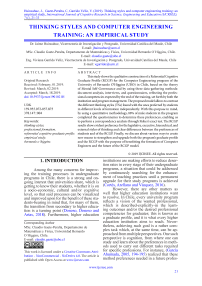Thinking styles and computer engineering training: an empirical study
Автор: Jaime Huincahue, Claudio Andrés Gaete-Peralta, Viviana Garrido-Véliz
Журнал: International Journal of Cognitive Research in Science, Engineering and Education @ijcrsee
Рубрика: Original research
Статья в выпуске: 1 vol.7, 2019 года.
Бесплатный доступ
This study shows the qualitative construction of a Referential Cognitive Graduate Profile (RCGP) for the Computer Engineering program of the University of Bernardo O’Higgins (UBO) in Chile, based on the theory of Mental Self-Governance and by using three data-gathering methods: document analysis, interviews, and questionnaires, reflecting the professional competencies expected by the end of the training, set forth by both the institution and program management. The proposed model allows to contrast the different thinking styles (TSs) found with the ones preferred by students in different levels of formation independently. With this purpose in mind, by using a quantitative methodology, 88% of male students in the program completed the questionnaires to determine these preferences, enabling us to perform a correspondence analysis through Fisher’s exact test. The RCGP results show evident preference for the legislative, executive, hierarchical, and external styles of thinking and clear differences between the preferences of students and of the RCGP. Finally, we discuss about various ways to create new means to strengthen and upgrade both the program’s graduate profile and the RCGP with the purpose of benefitting the formation of Computer Engineers and the future of the RCGP model.
Thinking styles, professional formation, referential cognitive graduate profile. empirical study, bernardo o'higgins
Короткий адрес: https://sciup.org/170198542
IDR: 170198542 | УДК: 159.955.072-057.875 | DOI: 10.5937/ijcrsee1901021H


